#death cap
Explore tagged Tumblr posts
Text




Went on a fungi foray today with the Devon Fungus Group and we found a beautiful specimen of a Death cap, Amanita phalloides.
#Death cap#amanita#Amanita phalloides#fungi#mushroom#mycology#nature#nature photography#photography#mushrooms#toadstools#forest#devon#Foray#Devon Fungus Group
105 notes
·
View notes
Text
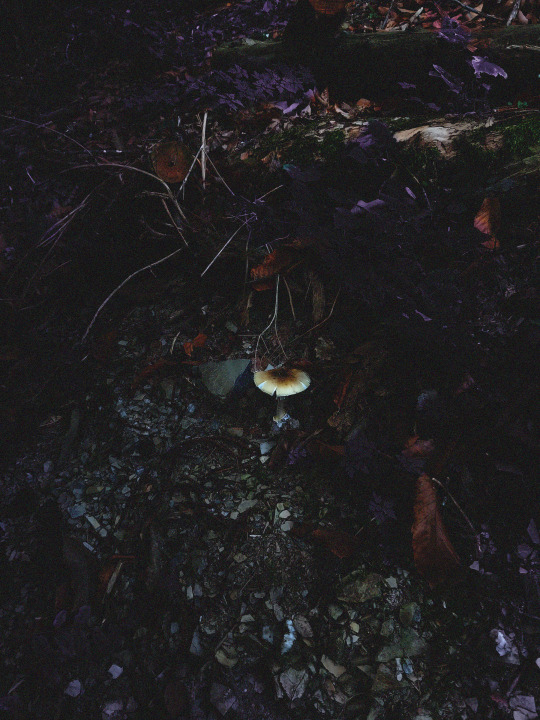
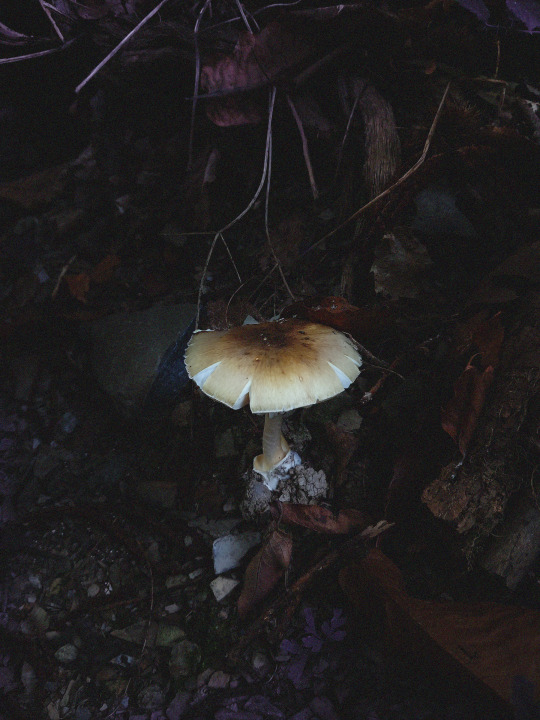
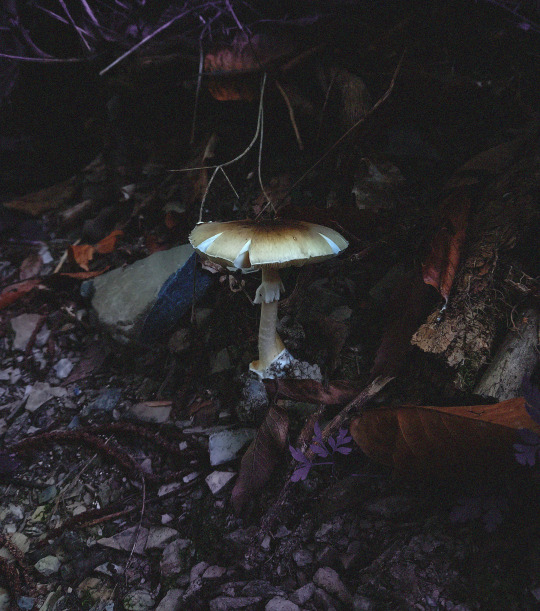
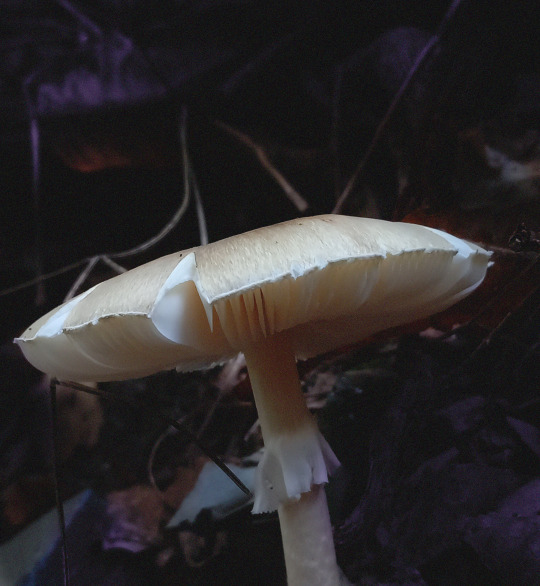

Amanita phalloides, commonly known as the death cap. It is one of the most poisonous of all known mushrooms.
Even very small fragments can be lethal (about 0.1 milligrams of fresh weight for every kilogram of weight of the person who ingests it), so about 7 mg for a 70 kg adult man; furthermore, the mushroom retains all its poisonous properties even after cooking, drying and freezing.
Found it today, 15 October 2023.
#original photographs#amanita phalloides#death cap#mushrooms#mushroomcore#fungi#mycology#foraging#autumn aesthetic#purple aesthetic#fairycore#dark fairycore#fairy aesthetic#fairy cottage#cottage witch#dark cottagecore#woods#forest#dark forest#forest floor#other#diary#studyblr#I found her!!!🥳🎉#it is not the destroying angel but I was also looking for this 🎉#Mary Katherine Blackwood likes this
202 notes
·
View notes
Text
CHAT!! IM IN LOVE!!




One of my moots told me they’d look cute together and I can’t get them out of my head!! AHHH!!!
#twisted wonderland#twisted oc#twst oc#twst#disney twst#twst wonderland#ivy jackson#author#jade leech#twst jade#Jade x Ivy#Death Cap
22 notes
·
View notes
Text
Daily Fungi Fact 84: Alpha-Amanitin(the main toxin in the death cap mushroom(Amanita phalloides)) is resistant to heat, enzymes, and acid, it is also suspected that it is resistant to freezing and thawing because some guy died after eating a mushroom that was frozen for 7-8 months.
7 notes
·
View notes
Text



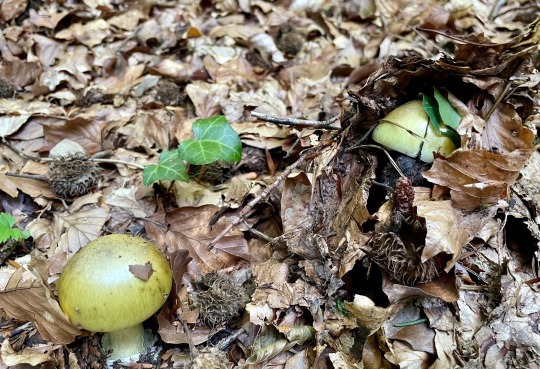
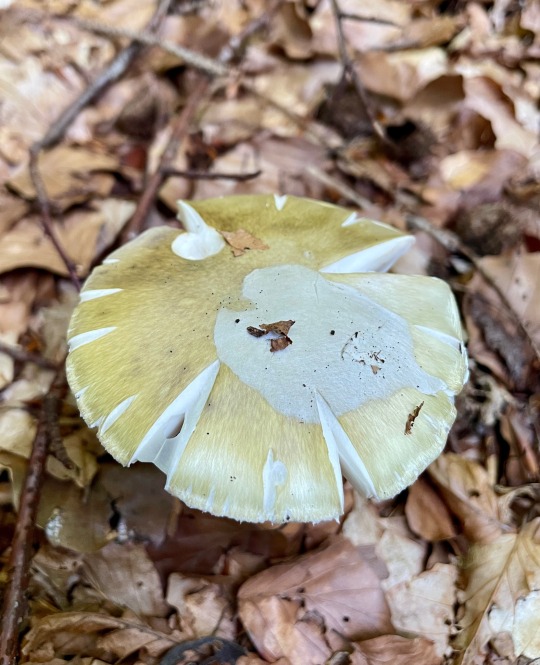

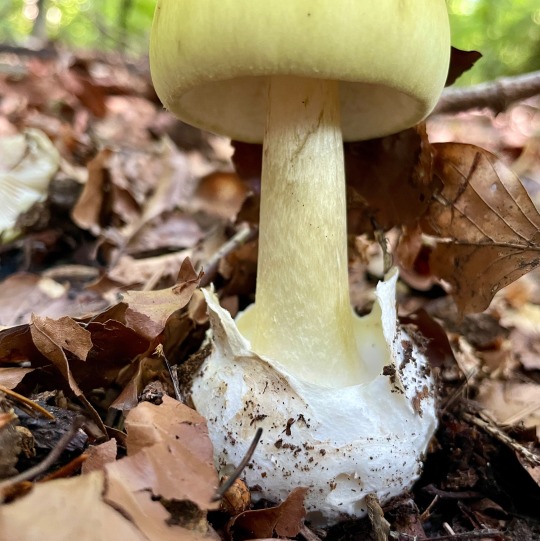
Grüner Knollenblätter Pilz, Amanita Phalloides, aka ,, death cap‘‘ 11.08.23
with all characteristics
#mushrooms#pilze#mycology#fungi#wild fungi#mushrooms switzerland#pilz#mushrooms of switzerland#pilzesuchen#basidiomycota#death cap#amanita#knollenblätter
82 notes
·
View notes
Text

The death cap mushroom (Amanita phalloides) is one of the most toxic and deadly mushrooms in the world. It’s responsible for the majority of fatal mushroom poisonings, as it contains potent toxins called amatoxins that are highly resistant to heat and enzymes, meaning they remain toxic even after cooking.
Characteristics of the Death Cap
Appearance:
Cap: It has a pale green to olive-brown, smooth cap that can be mistaken for other edible mushrooms. The cap is usually 5–15 cm in diameter, with a somewhat sticky surface when wet.
Gills: The gills beneath the cap are white and free (not attached to the stalk).
Stalk: The stalk is white or pale, with a swollen base that may have a cup-like structure (volva).
Spore Print: The spore print of the death cap is white.
Habitat:
It is most commonly found in temperate regions, particularly in Europe and North America, often growing in association with hardwood trees like oak, chestnut, and pine.
It thrives in moist environments, typically appearing in late summer or fall.
Toxicity and Symptoms of Poisoning
Death cap mushrooms contain several toxic compounds, with amatoxins being the most lethal. These toxins inhibit RNA polymerase II, a critical enzyme in protein synthesis, leading to cell death—especially in the liver and kidneys.
Poisoning Stages:
Latency Period (6-12 hours): After ingestion, there is a deceptive phase with no symptoms, which can lull people into a false sense of security.
Gastrointestinal Phase (12-24 hours): Violent abdominal pain, vomiting, and diarrhea occur, leading to dehydration and electrolyte imbalance.
Apparent Recovery (1-2 days): Symptoms seem to improve, but this is an illusion. Meanwhile, liver and kidney damage is worsening internally.
Liver/Kidney Failure (3-5 days): If untreated, the liver and kidneys begin to fail, leading to coma and potentially death.
Treatment
Immediate medical attention is critical. Hospital treatment often involves:
Activated Charcoal: Administered to absorb any remaining toxins.
Intravenous fluids: To manage dehydration.
Liver Transplant: In severe cases, patients may require a liver transplant to survive.
Unfortunately, even with aggressive treatment, the death rate for death cap mushroom poisoning can range from 10–30%.
Edibility Confusion
One of the most dangerous aspects of the death cap is its resemblance to edible mushrooms. It can easily be confused with mushrooms like the paddy straw mushroom (Volvariella volvacea) and the caesar’s mushroom (Amanita caesarea), particularly in its early stages of growth.
Cultural Impact and History
Death caps have a long and infamous history:
In ancient Rome, they were believed to have been used in political assassinations, notably in the death of Emperor Claudius.
Poisonings continue to occur worldwide, often involving foragers who mistake the death cap for an edible mushroom, particularly in areas where foraging is common.
Conclusion
The death cap mushroom is a highly toxic species that requires caution and awareness. It highlights the importance of proper identification and knowledge for those who forage mushrooms.
Get yourself my art works to add to your collection of mushrooms:


#ainight#handmade#art#mushroomcore#artists on tumblr#mushroom art#artists of tumblr#mushrooms#stay vigilant#tumblr#artists of threadless#threadless#death cap#poisonous mushrooms#poison#dead#deadly#mushroom love#mushrooms that can kill you
9 notes
·
View notes
Text

Don't Touch It!
pixel_dailies : mushroom : 6/23/24
BlueSky | Ko-fi | Upwork
#animation#pixel art#pixel artist#pixel art animation#looping animation#digital animation#digital art#2d animation#pixel dailies#artists on tumblr#mushroom#death cap#fungus#spore#deadly
17 notes
·
View notes
Text


look at these mushroom pictures i took this morning!! 🍄✨🍁🍂
#beautiful photos#photografy#photo#photos#potography#photographs#photography#mushrooms#mushroom#death cap#fly agaric#amanita#autumn#fall season#fall vibes#fall aesthetic#spooktober#spooky season#halloween#samhain#original photographs#original photo#SPOOKY SEASON LETS GOOOOOO
34 notes
·
View notes
Text
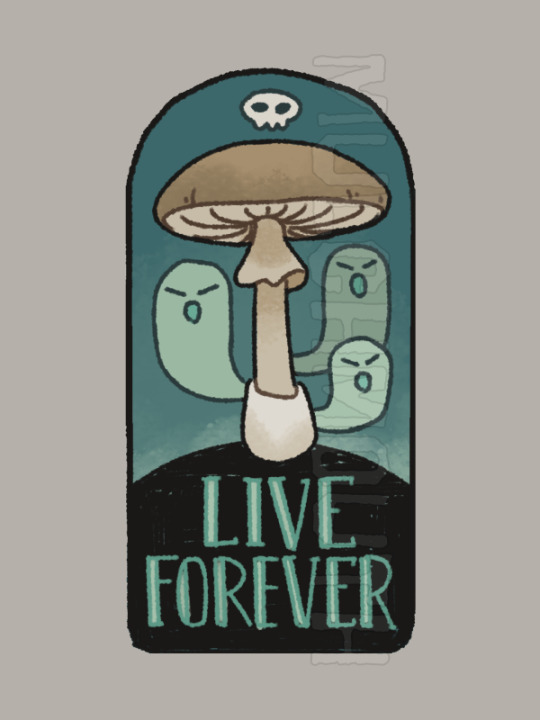
Eating random mushrooms is a totally good and well advised idea
10 notes
·
View notes
Text

☠️ Toxic ☠️
22 notes
·
View notes
Text
Daily Fungi Fact 17: The death cap mushroom(Amanita phalloides) is the deadliest of all mushrooms, the main toxin in it is alpha amanitin. Alpha amanitin causes the cells in your liver to burst, leading to diarrhea and cramps, that then pass, causing you to think you are safe, eventually your liver and kidneys will fail and you will die within around a week.
(do not eat the death cap mushroom, it has death in the name this should be obvious)
3 notes
·
View notes
Text
Death Cap (Funguary drawing) by @feefal_

1 note
·
View note
Text

#ainight#art#mushroomcore#artists on tumblr#mushrooms#mushroom art#artists of tumblr#death cap#death cap mushrooms#amanita mushrooms#amanita phalloides
3 notes
·
View notes
Text
I think I might have found a Destroying Angel? Or a Death Cap?
I'm new to mushroom identification and it was impossible to see the gills, so I'm asking Mycology Tumblr for a hand

Found in central Alberta
3 notes
·
View notes

